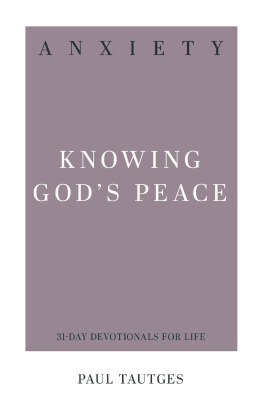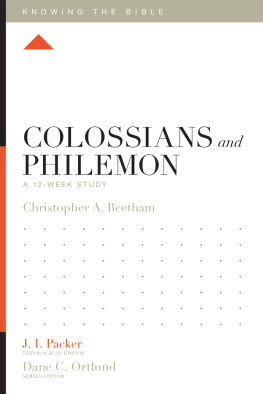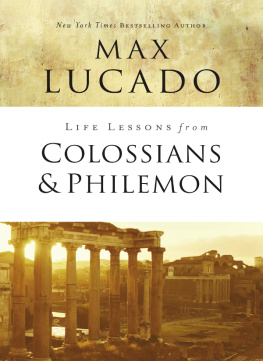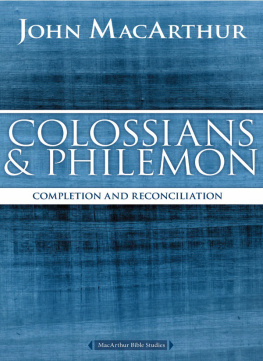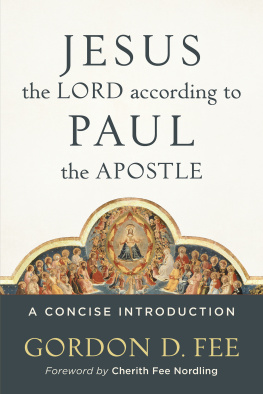F irst, I thank Brian Forman. As with every endeavor I undertake, this project came to fruition only through his steadfast partnership. Second, I thank the Gibson family, who generously provided an opportunity for me to get away to focus on the final manuscript for this devotional. Third, I thank Karis Oh, who in passing suggested the idea for this book. Finally, I thank my wife, who is my rock.
Series Introduction
This short book on the Letter to Philemon is the first installment in this devotional series. The idea for this series came from Karis, a member at my church who expressed her preference to delve into specific sections of the Bible. While committed to reading the Bible cover to cover as often as possible, she was at a point in life where she wanted to go beyond passive reading. In short, she wanted to engage in reading that entailed pausing, reflecting, and praying over shorter units. This series is my attempt to meet this desire.
Three preliminary remarks to the series might enhance your experience of this devotional.
First, before penning anything, I memorized the letter (which is only a single chapter comprised of twenty-five verses). Bible memorization is a regular practice of mine first encouraged by my mother during the summer between third and fourth grade and later reiterated by my professor in New Testament during seminary. Its far easier for me to comment on any part of the Bible when its in me (literally). Thus, I spent a month memorizing the letter and jotting down random thoughts on my iPhone as they came throughout the day. Only after feeling like its in me did I begin concrete work on this devotional.
I encourage you to memorize as much of the letter as possible, before and while working through this devotional. Life is complicated, and often we lack crystal-clear answers to any given situation. This is where biblical instincts come in, instincts borne out of years of Bible memorization, meditation, and application. The common response is, I cant memorize chunks of the Biblemy memory has gotten so bad. My encouragement: Youll be amazed at what you can do once you get started. But it will require much deliberationtaking pockets of time throughout the day to set aside social media and let your mind sit on a verse or two. Few things have served my soul better than Bible memorization.
Second, I have no interest in saying anything innovative. My assumption is that when people pick up a devotional, they are looking to hear an amplification of what God says in his revealed Word. Thus, my burden with each entry has been to bring out both the meaning and the intended effect of the text. To this end, I made an analytical outline of the letter using the original Greek and referenced the best commentaries to ensure I was coming as close to the original meaning and rhetorical purpose of the apostle Paul. Nevertheless, the final output was purposefully nonacademic: I tried to use plain language to minimize distraction and to amplify the meaning of the inspired text.
Finally, each installment in this series focuses on a single topic. To be sure, we touch on sub-topics related to the main subject, but, all in all, I focus on a single topic. The reason for this is because of my growing belief that we accomplish far more in life by trying to do far less. Personal change is hard. Ill never become more generous, less angry, more integrous, less covetous by tackling everything at once. Instead, focusing on one virtue for at least six to twelve months leads to deeper and lasting change. If the reader detects some redundancy as a result of this approach, I will have done my job.
This devotional focuses on the topic of reconciliation. Closely related are the topics of mediation and winsome communication. As I have written elsewhere, reconciliation is a lost mandate that needs to be recovered in the Church today. For all these reasons, the Letter to Philemon stands as a model of how we can mature as makers of peace in our churches. My hope is that this extended reflection on the letter will facilitate that goal.
Let the word of Christ dwell in you richly...Colossians :
. Noteworthy are the commentaries of Peter OBrien, N. T. Wright, Douglas Moo, and Dick Lucas. Also, in this commentary I use the English Standard Version translation except in a few instances.
. See Charles Duhiggs The Power of Habit and Gary Kellers The One Thing , which suggest the same.
. See my comments in Unreconciled .
. Wright, Epistles , : [The Letter to Philemon] is no mere casual note, but a carefully crafted and sensitively worded piece, employing tact and irony.
H istorical reconstruction is always a bit tricky. I can hardly remember what I did last Wednesday. How much more challenging must it be to piece together a detailed and accurate background of exactly what took place many years ago.
Still, the letter itself does provide some basic clues. First, the main cast of characters. There is Paul who is writing from prison. Then there is Philemon, a leader among the church that meets in his house; we can assume Philemon was a man of means. Finally, theres Onesimus, apparently a runaway slave who came to faith through Pauls ministry and has now been sent back to his master, Philemon. An important detail in all this is that both Philemon and Onesimus have come to faith (at separate times) through Paul.
Whats a bit murky are the details of the conflict between Philemon and Onesimus. That Onesimus abandoned his master suggests that the conflict was bad enough that the two had to be divinely separated. At a first glance (and this might very well be the case), it appears that Onesimus had wronged Philemon. Badly. But toward the end of the letter, Paul indicates through the suggestive statement, If he has wronged you, that this might not have been the case and that Philemon is essentially overreacting. Whatever the conflict actually entails, we know that Philemon is nowhere near a point of wanting to be reconciled with Onesimus even though both now share a common faith and fellowship in the Lord.
Paul, wanting to see the two reconciled and concerned for how a continued unreconciled state will impact the general community of faith, pens this letter to encourage Philemon to receive back Onesimus. Paul is fully aware of how tense the situation is. Therefore, rather than adopting a direct approach, he opts for a winsome and indirect appeal by identifying himself with both persons and then highlighting their new relationship to each other through Paul and in Christ.
. Much more detailed and scholarly background information can be found in the Introduction sections of the commentaries previously mentioned.
. Wright, Epistles , : As Luther saw, Paul plays Christ in the drama, identifying himself with both sinner and offended party, so making peace...
. Ibid, .
N otable is Pauls use of the identifier prisoner instead of his more typical title apostle. The latter conveys authority, the former weakness. Why does Paul do this? After all, its human tendency to highlight ones status. Reflecting on this question is important because it provides some insight into the content, purpose, and strategy of the letter.


